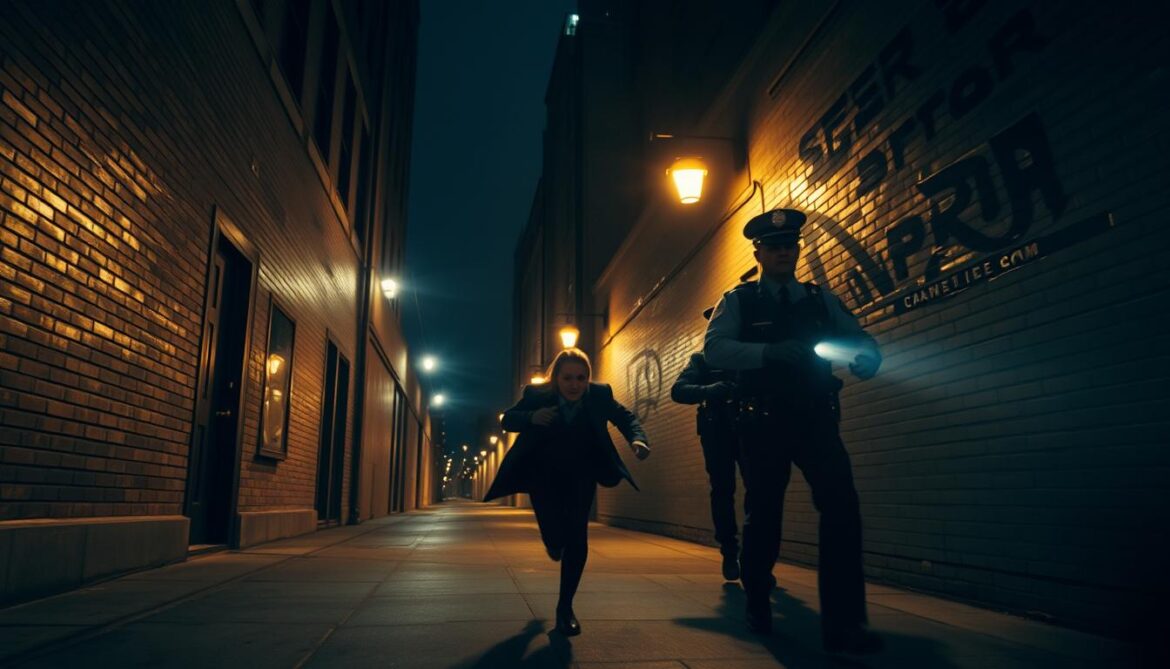In Canada, the number of people trying to escape police has gone up by almost 12% over ten years. It’s very important to know about the charge of fleeing from a peace officer and what it means. This detailed guide offers important info and practical tips to help you avoid running from a peace officer.
With this knowledge, you can have safer and smarter dealings with the police. You’ll also learn about the serious legal consequences and other choices you have during police stops in Canada.
Understanding the Legal Definitions
When we talk about the Criminal Code Canada, it’s vital to know the legal definitions of flight from peace officer. This helps you know your rights and duties under the law. First, we take a look at Section 320.17.
Criminal Code Section 320.17
According to Section 320.17, it’s a crime to not stop your car or boat when a peace officer chases you. You must stop unless you have a good reason not to. It’s important to understand this to know when not stopping is against the law.
What Constitutes Flight from a Peace Officer?
To understand what counts as evading a peace officer, the law in Canada checks a few key elements. The officer must clearly show who they are and tell you to stop. If you decide to run away on purpose, the law sees it as *flight from peace officer*. Knowing what this means helps you stay on the right side of the law and avoid big trouble.
| Criteria | Description |
|---|---|
| Pursuit Initiated by Peace Officer | The officer must signal, such as using lights or sirens, to indicate the driver should stop. |
| Failure to Stop | The driver fails to comply with the peace officer’s signal to stop the vehicle or vessel. |
| No Reasonable Excuse | There must not be a valid reason for failing to stop, which would otherwise be recognized under typical circumstances. |
The Consequences of Fleeing Law Enforcement
Trying to escape from law enforcement in Canada can lead to big legal problems. Escaping police is dangerous and leads to strict consequences. By understanding what could happen, you can make smarter choices and follow the law.
Potential Penalties
Penalties for escaping police depend on the situation. Escaping from an officer is a serious matter. The government can choose to handle it in two ways. Going to court could mean up to 10 years in prison. Or, you might get a shorter jail time and have to pay fines. This shows why it’s crucial to listen to police officers when you meet them.
Aggravating Factors
Some actions can make the consequences worse. These include putting others in danger, having kids in the car during the chase, or causing someone to get hurt. Each of these can make the penalties much harsher. It shows how important it is to follow police orders.
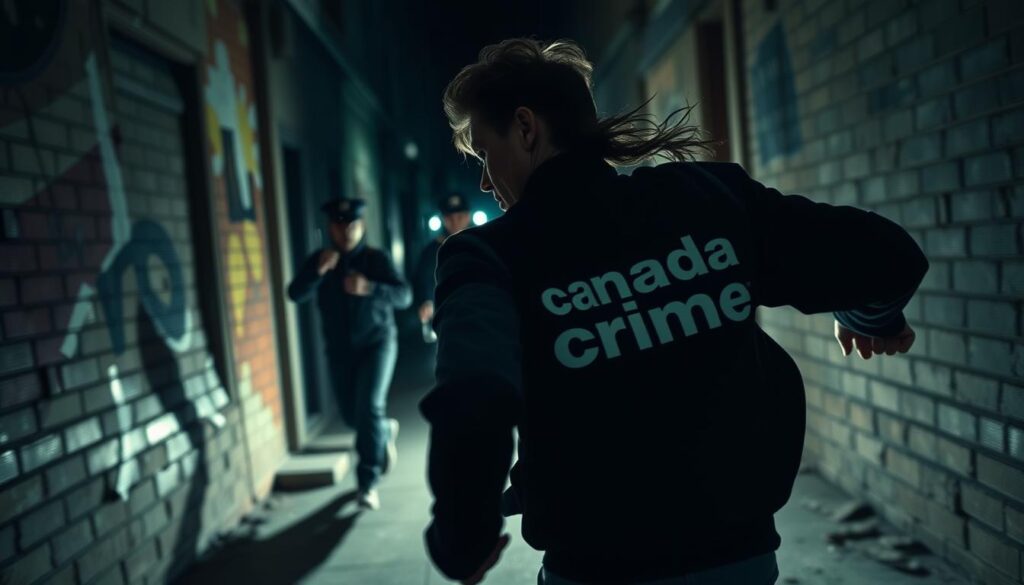
Thinking about the serious legal consequences can stop people from making rash and dangerous choices. Keeping safe and following the law is very important. It helps keep order and stops more legal problems.
Tips to Prevent Flight from a Peace Officer
Understanding how to stay calm and respectful is key to avoiding flight from a peace officer. Using careful strategies helps prevent problems and makes the interaction smoother.
Stay Calm and Composed
Keeping your cool during a police encounter is crucial. Take deep breaths and stay calm. This helps you make good choices and avoids misunderstandings.
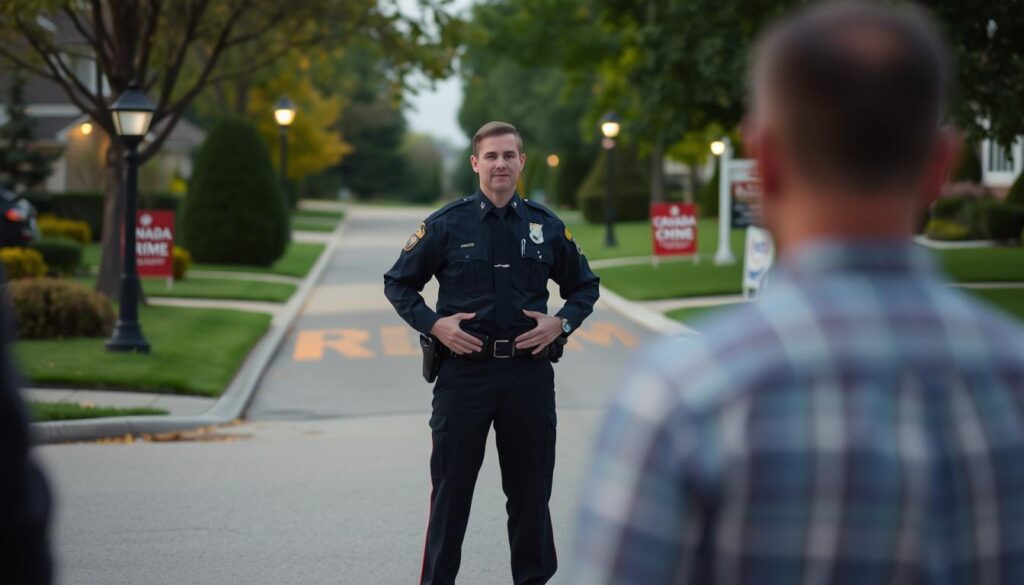
Respectful Interaction with Officers
How you act matters a lot. Being polite and following instructions is important. It shows you’re willing to work with them and respect the law.
Avoid Rash Decision-Making
Rushing decisions can worsen a police stop. Think before acting. This prevents the situation from getting worse.
Legal Requirements During a Police Pursuit
When involved in a police chase, it’s important to know what’s expected of you and the officers. Understanding your roles ensures everyone’s safety and follows the chase rules.
Your Responsibilities
Firstly, stop your car quickly and safely if a cop signals. Don’t try to escape by driving dangerously or speeding. It’s your duty to obey the police during a chase.
Officer’s Duties
Officers must stick to certain steps in a pursuit to protect everyone. They need to decide if the chase is necessary, communicate well, and use the right methods to end it safely. It’s crucial they follow chase guidelines to reduce risks.
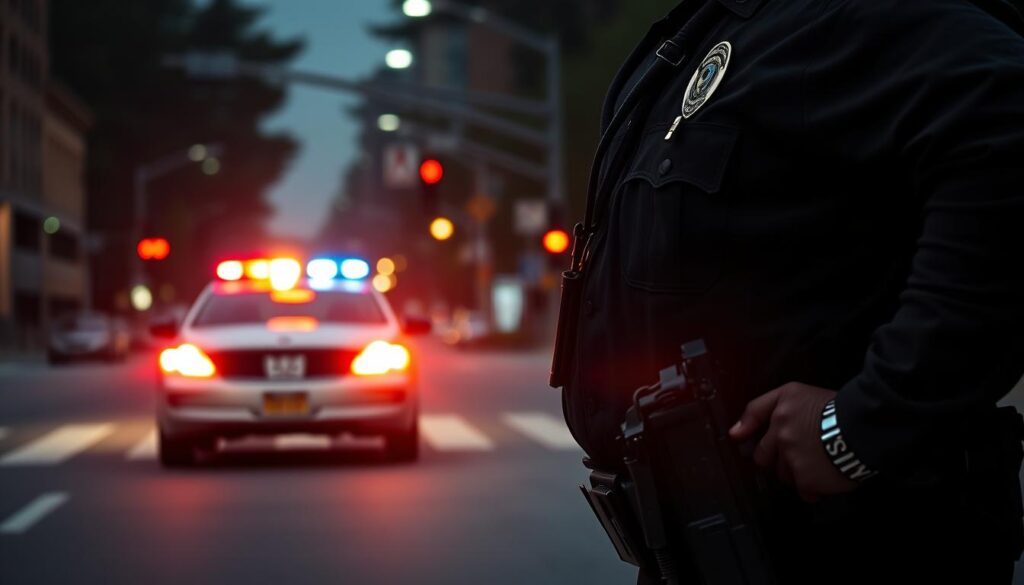
Common Misconceptions About Evading Police

It’s important to know the truths about evading police to avoid legal trouble. Many think it’s okay to run if they don’t see a cop car nearby. This is completely false. In reality, trying to avoid arrest can get you into deeper legal issues.
Thinking you can argue your way out of a stop after running is a mistake. This wrong belief can make your legal problems worse. Many also wrongly assume that minor crimes won’t lead to a serious police chase. The crime’s seriousness, along with threats and how the suspect acts, are all vital for police actions.
Many misunderstand how police use force. Some believe officers can only use a little more force than the suspect. But courts look at the situation with a detailed three-step test. According to Police1, they consider the crime’s severity, any immediate danger, and if the suspect is resisting or escaping.
To clear up these misconceptions, let’s look at these comparisons:
| Common Misunderstanding | Actual Legal Standpoint |
|---|---|
| You can legally evade if no patrol car is visible. | Evading is illegal and can lead to greater legal penalties. |
| Minimally resisting will not provoke severe law enforcement responses. | Law enforcement responses depend on crime severity and immediate threats, not merely resistance level. |
| You can challenge the stop’s legitimacy after evading. | Disputing legality after the fact can complicate and worsen consequences. |
Understanding the true legal principles instead of myths about evading police protects you. It prepares you to interact with police in a lawful and responsible way.
Best Practices When Pulled Over by Police
Being stopped by the police can feel scary. It’s important to know how to behave and talk to the officer to keep things smooth. Follow these steps to handle a police stop correctly.
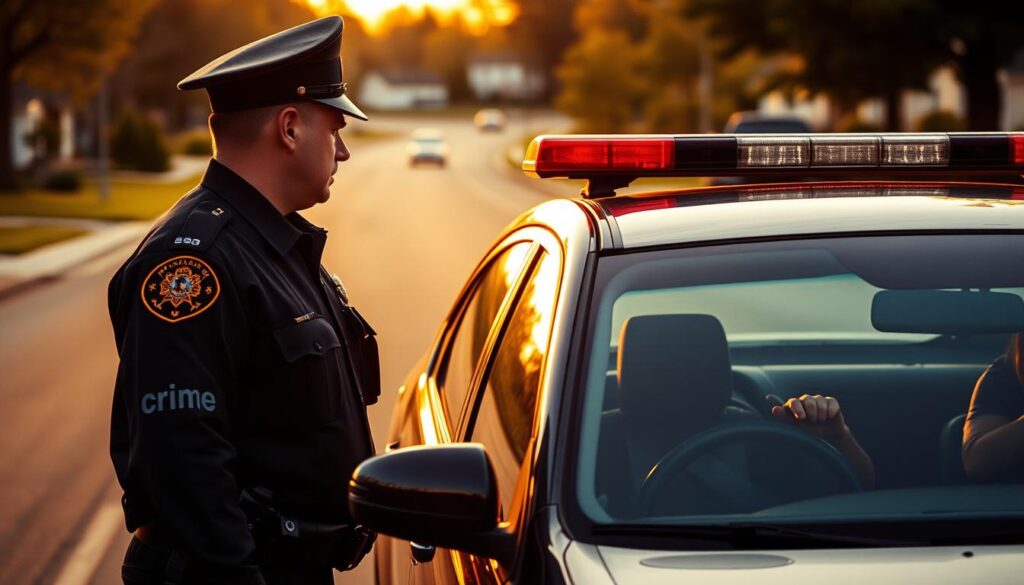
Immediate Actions to Take
If the police are pulling you over, stay calm and move safely to the road’s side. Shut off your engine, and keep your hands where the officer can see them on the steering wheel. Don’t make quick moves or grab anything unless the cop tells you to. This reduces any worries and makes your actions clear.
Communicating Effectively with Officers
Talking the right way is very important during a police stop. Wait for the officer to come to you and start talking. When they ask, give them your driver’s license, car registration, and insurance quickly. Being polite and working with them helps avoid problems and makes things go smoother.
“The way you interact with officers can significantly impact the outcome of the stop. Staying calm and polite while following protocol police stop can make a big difference.”
Knowing what to do when the police stop you and how to talk to them helps you feel more confident. And always remember, being cooperative and respectful helps a lot in these situations.
Knowing Your Rights Interacting with Police in Canada
Understanding your Canadian Charter rights is key when talking to the police in Canada. This important document guards your legal rights when you’re dealing with police, making the legal process transparent and fair.
Protection under the Charter of Rights and Freedoms
The Canadian Charter of Rights and Freedoms protects many vital rights during police interactions. You have the right to stay silent and the right to talk to a lawyer without delay. It’s key to stand up for these rights politely but strongly to make sure you’re legally safe during the interaction.
Legal Recourse for Misconduct
If you think your Canadian Charter rights were broken, knowing how to recourse police misconduct is important. You can complain to the proper oversight group or get advice from a lawyer to look into court actions. Going down these paths helps keep the legal system honest and makes sure there’s responsibility.
Steps to Take If You Are Charged
If you’re charged by the police, knowing what to do is key. Acting quickly can change the outcome of your case.
Consulting a Criminal Lawyer
It’s smart to consult a criminal lawyer right away. They’ll explain the charges, look at the evidence, and plan a strong defense. A lawyer is crucial for understanding your case and protecting your rights.
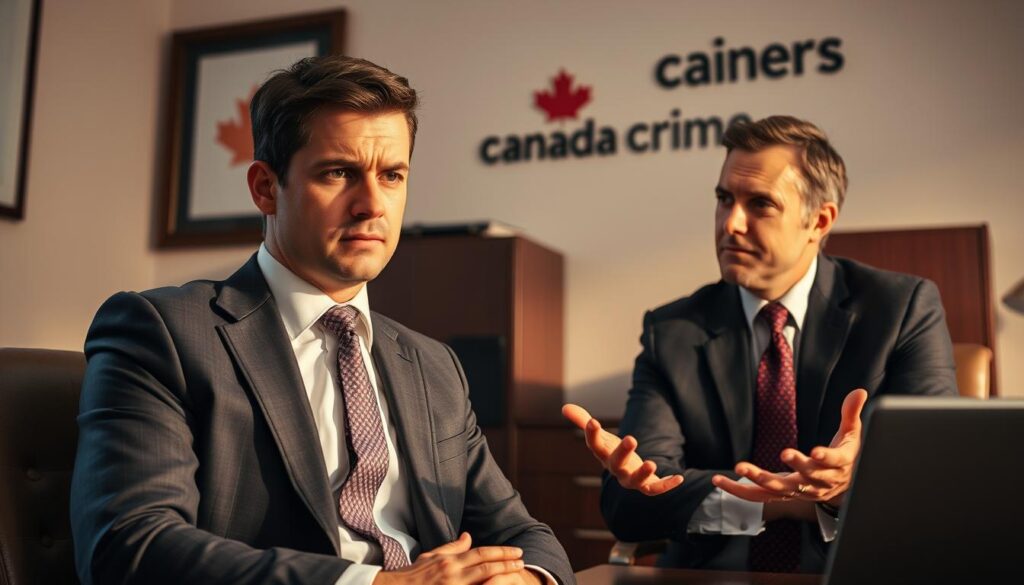
Preparing for Court
Getting ready for court is important. Your lawyer will help with evidence, witnesses, and courtroom rules. Knowing court procedures is also vital.
| Key Steps | Action Required |
|---|---|
| Consult a Criminal Lawyer | Seek legal guidance immediately |
| Understand Charges | Review the nature and details of the allegations |
| Evidence Collection | Gather and organize evidence for your defense |
| Witness Preparation | Ensure witnesses are ready and briefed |
| Courtroom Familiarization | Learn about court procedures and rules |
These steps make you ready for court and help you face the judicial process.
Understanding the Reverse Onus Bail System
The reverse onus bail system is a key part of Canadian bail laws. In specific cases, like when someone is accused of fleeing from the police, the accused has to prove why they should get bail. Normally, it’s up to the prosecutor to show why someone should stay in jail. But here, you have to show why getting bail is right.
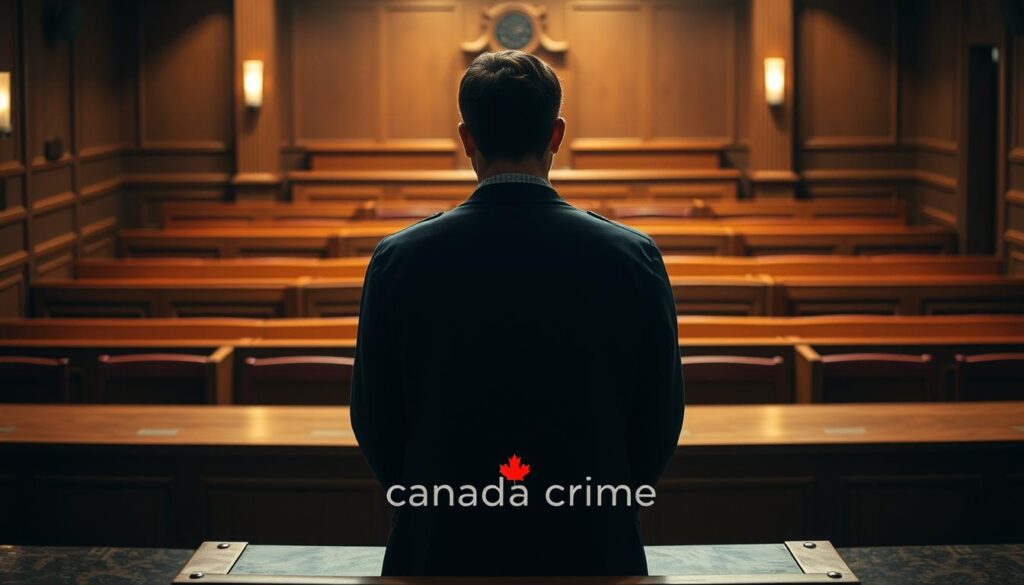
It’s crucial to understand this system to navigate Canadian bail laws well. To get bail, you need strong evidence that you’re reliable and should be released. This evidence can include your community ties, job, and if you have no past crimes.
Knowing how the bail process works, especially with the reverse onus aspect, is very beneficial. This knowledge can help a lot in bail hearings, especially if you’re accused of running from the cops. Being well-prepared increases your chances for a good result.
Role of the Courts and Sentencing in Canada
The Canadian justice system works to make sure legal processes are fair. This includes everything from the first court appearance to the final sentencing. Knowing how the courts operate, the pleading process, and sentencing rules is key to understanding legal matters.
How Pleadings Work
In Canadian courts, pleadings are a crucial step in the legal process. A pleading is where the defendant says if they are guilty or not guilty. This decision shapes the rest of the legal proceedings. Pleadings ensure everyone knows the claims and defenses, preparing for the trial or agreement.
Sentencing Guidelines
Sentencing in Canada follows strict guidelines to ensure fairness and consistency. These rules help judges decide on the right penalty, considering the crime’s nature and effects. Sentencing takes into account the criminal’s past, the damage caused, and any special circumstances. It aims to ensure justice, prevent future crimes, and rehabilitate offenders.

Legal professionals and those accused of crimes need to understand how the Canadian courts work. Knowing how to handle legal pleadings and the sentencing process helps in dealing with legal issues better.
| Aspect | Description |
|---|---|
| Legal Pleadings | Formal statements by parties in a lawsuit outlining their claims and defenses. |
| Sentencing Guidelines | Frameworks used by judges to determine suitable penalties. |
| Canadian Courts Function | System ensuring fair and just legal proceedings. |
Resources for Legal Help in Canada
Finding the right help in legal troubles is key. Legal aid resources in Canada help with many issues, like criminal and civil cases.
Contact Information for Legal Aid Services
Getting legal aid can make a big difference in dealing with legal problems. Every part of Canada has its own legal aid program. You can contact Legal Aid Ontario or the Legal Services Society in British Columbia for help.
These groups offer help like representation, advice, and info if you qualify.
Local Legal Consultation Services
There are also local legal consultation services apart from government ones. Many law firms have first meetings for free or cheaper. Using these services is a smart move to fully understand your legal rights.
For deeper legal advice, you should see a professional. Visit this link for more info.
Knowing who to call for legal help can really change things when in trouble. Services like the Canadian Bar Association’s Find-a-Lawyer help you find the right expert.
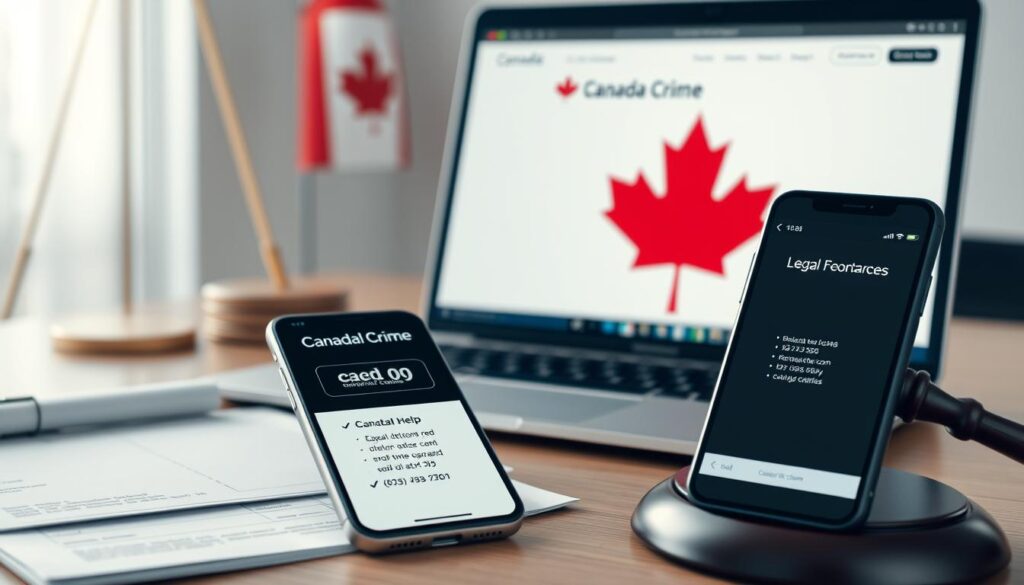
Conclusion
This guide thoroughly explored critical points on how to interact with peace officers. It covered everything from the legal meaning of running from an officer to the serious outcomes of dodging the police. Knowing your rights and duties during these times is vital.
In any encounter with law enforcement, staying calm and polite is key. Being aware of what the law expects from you during a chase and how to talk to officers can change how things turn out. Making hasty decisions can lead to big legal problems. It’s wise to ask a criminal lawyer for advice if you face charges and to get ready for court.
Understanding the legal rules about dealing with peace officers in Canada prepares you to handle these situations safely and within the law. By following the advice given, you can lessen the risks of facing charges from trying to evade the police and work towards a better outcome.

